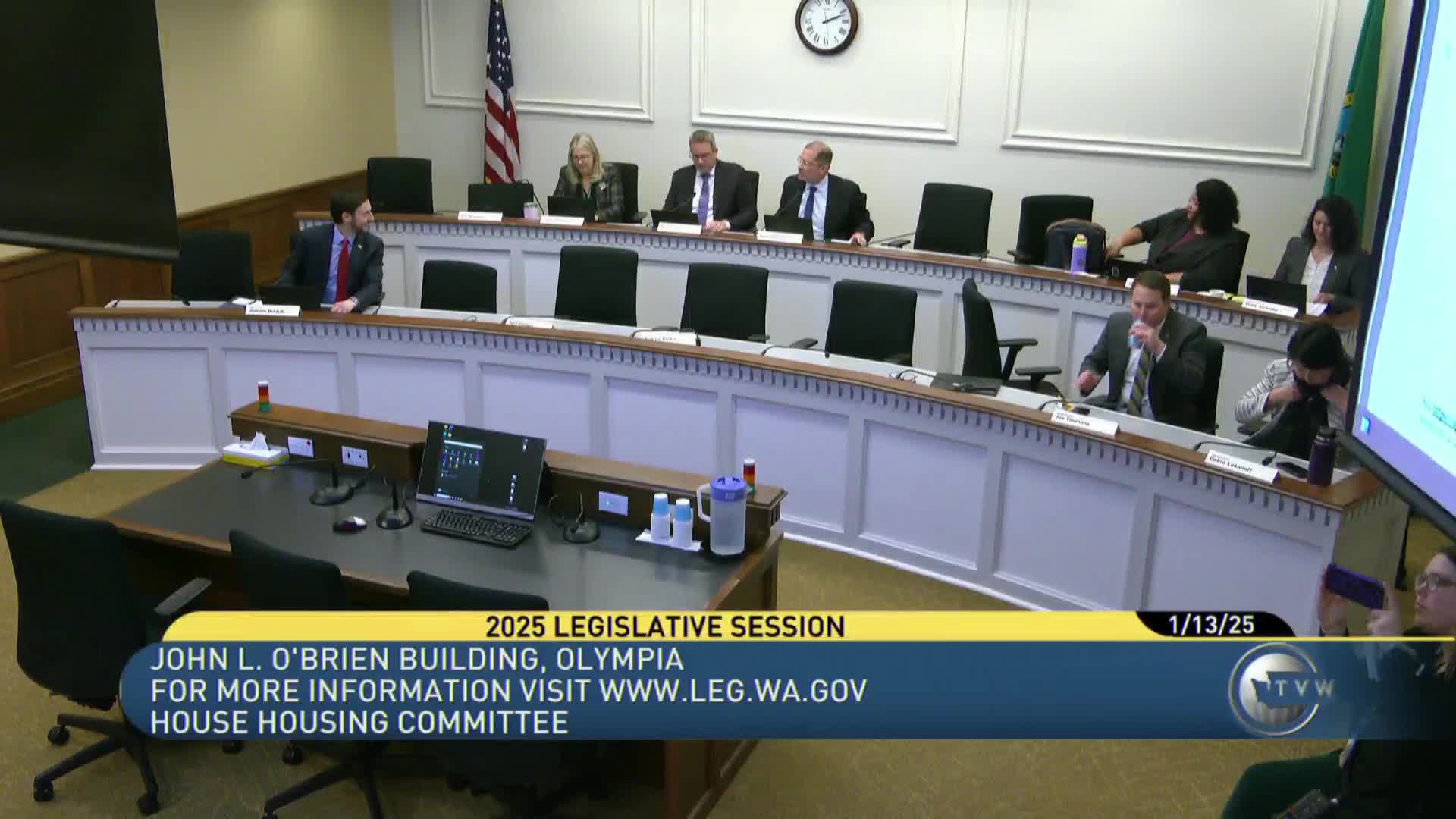Committee hears House Bill 1096 to allow administrative lot splits, cities and mayors voice support and safety concerns
Get AI-powered insights, summaries, and transcripts
Subscribe
Summary
The House Housing Committee on Jan. 13 heard testimony on House Bill 1096, which would require cities subject to minimum density requirements to include in their short-plat regulations a process for an applicant to seek administrative review and simultaneous approval of a lot split and a building permit for new single-family or middle housing.
The House Housing Committee on Jan. 13 heard testimony on House Bill 1096, which would require cities subject to minimum density requirements to include in their short-plat regulations a process for an applicant to seek administrative review and simultaneous approval of a lot split and a building permit for new single-family or middle housing.
The measure is pitched by supporters as a way to speed infill and implement the state’s middle-housing laws; opponents, including several city officials and Mercer Island’s mayor, urged stronger protections for critical areas and more time and guidance for local implementation.
Serena Dolly, staff to the committee, summarized the measure’s core terms: “The bill requires any city, subject to minimum density requirements, to include in their short plat regulations a process for an applicant to seek simultaneous review and approval of a lot split and building permit for new single family or middle housing.” Dolly said the process would allow an administrative decision by a planning director without a public hearing when specified conditions are met.
Representative Andrew Barkis, prime sponsor, told the committee the bill is intended to make it easier to build housing within urban growth areas and to implement prior middle-housing reforms. “This is a bill that is integral and important to that process,” Barkis said, noting stakeholders had revised the bill to address implementation concerns.
Major provisions discussed at the hearing included: - An administrative (non‑public‑hearing) decision path, reviewed and approved or denied by the planning director. - A limit that only one new lot may be created through the split. - Minimum lot sizes: both the parent lot and the new lot must be at least 1,000 square feet. - A prohibition on administratively splitting a lot that is itself already the product of an administrative lot split. - A prohibition on imposing a lot-split condition that would reduce the number of dwelling units otherwise allowed on the parent lot; any construction remains subject to existing state and local laws, including the state building code.
Supporters told the committee the change would speed small-scale infill and help homeowners stay in place while creating opportunities to add units. Bill Clark of Washington Realtors said the bill is “a mechanism to build the same number of units that you could build under middle housing, but to have more lots to build them on.” Scott Hazelgrove of the Master Builders Association described lot splitting as “an important tool to provide flexibility, especially on infill.” Ryan Donahue of Habitat for Humanity of Seattle King and Kittitas Counties said the provision could create affordable homeownership opportunities.
Local officials and planning staff urged caution. Salim Nies, mayor of Mercer Island, testified in opposition and warned of safety risks in some jurisdictions, saying, “Please learn from California’s tragedy,” and asking the committee to “reject this bill, and prevent these risks in Washington.” Carl Almgren, community planning manager for Lynnwood, said subdivisions that involve critical areas are not “simple” and recommended excluding parent lots that contain critical areas from eligibility for administrative lot splits. Carl Schroeder of the Association of Washington Cities said the bill has improved but that some subdivision-review elements (tree retention, concurrency, safe routes to school) remain unclear.
Committee members and city witnesses also pressed for an implementation timeline tied to Commerce Department guidance. Several speakers requested at least six months, with one jurisdiction asking that the implementation clock begin when the Department of Commerce issues guidance, not on enactment, to avoid short turnaround times for small cities with limited staff.
No committee vote was taken. The chair closed the public hearing on HB 1096 and invited additional written comments; staff and sponsors said they expect further work and possible amendments as the bill moves through the process.
Background and next steps: the sponsor and multiple witnesses said the bill or related lot-split approaches have been considered in prior sessions and that stakeholders have negotiated changes over the interim. Committee staff and several cities asked for clear Commerce guidance and a reasonable implementation timeline to avoid unintended consequences for local critical-area reviews and appeals.
